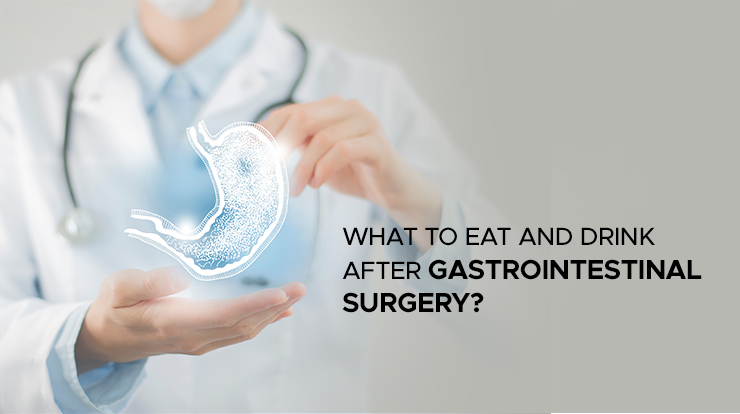
Treatment for digestive system organs like the gallbladder, liver, pancreas, oesophagus, small intestine and large intestines, and rectum is called gastrointestinal surgery. These operations are frequently carried out by medical professionals with a strict diet after gastrointestinal surgery to treat a condition and remove a damaged digestive system component, such as a malignant or benign tumour.
Colectomy, gastrectomy, and gastric bypass surgery are a few examples of the various GI procedures. Depending on the gastrointestinal surgery you have, the size of your stomach or intestines may change. Thus, to recuperate fast and prevent complications, persons who have had gastric surgery will need to make some dietary changes.
Patients suffering from gastric bypass surgery, also known as a Roux-en-Y gastric bypass, as well as from sleeve gastrectomy can recuperate and alter their eating patterns with the aid of a gastric bypass diet. The diet after gastrointestinal surgery will include a liquid diet after GI surgery.
Guidelines for diet after gastrointestinal surgery include:
Following gastric bypass surgery, several diets are advised depending on each patient’s unique circumstances. A liquid diet after GI surgery often takes a stepwise approach to assist you to ease back into eating solid foods. How quickly your body heals and adapts to the change in eating habits determines how quickly you advance from one phase to the next. You can often start eating regularly again three months after surgery.
As you progress through the gastric bypass diet, be mindful of:
You won’t be able to drink anything but clear drinks for the first few days following surgery. For following a liquid diet after GI surgery you can begin using different liquids, such as:
You can start eating strained and pureed foods if you have been able to tolerate a liquid diet after GI surgery for about a week. Without any identifiable food solids, the ingredients should have the consistency of a thick paste or smooth liquid. Three to six modest meals are acceptable each day. Every meal should be consumed gently for over 30 minutes. Pick ingredients that purée nicely, such as:
Combine liquid and solid foods, such as:
You can introduce soft foods to your diet after a few weeks of pureed meals and a liquid diet after GI surgery if your doctor gives the go-ahead. These food items ought to be bite-sized, delicate, and simple to chew. You are permitted to consume three to five modest meals per day. A third to a half cup of food should be consumed at each meal. Before eating, chew each bite thoroughly to achieve pureed-like food. Soft foods consist of:
You can gradually resume eating firmer foods once you’ve followed the diet after gastrointestinal surgery for roughly eight weeks. Start by eating three meals per day, with one to one and a half cups of food at each meal. Avoid eating until you are stuffed to the gills. You may be able to adjust how much food you eat at each meal and how many meals you have each day, depending on how well you handle solid food.
What is best for you should be discussed with your nutritionist. Eat one new food at a time. Following gastric bypass surgery, some foods may induce discomfort, nausea, or vomiting. At this point, foods that may be problematic include:
With your doctor’s approval and with time, your diet after gastrointestinal surgery might be allowed to reintroduce some of these foods.
Dr Vivek Vij is best Liver Transplant Surgeon in india can answer any queries and address any worries you may have regarding your post-gastrointestinal surgery diet. He is renowned for carrying out Liver Transplant in India with the fewest biliary problems and for incurring the fewest costs from these complications after surgery. Additionally, he is a member of the Indian Society of Organ Transplantation (ISOT).


